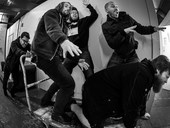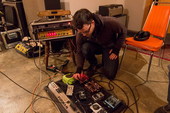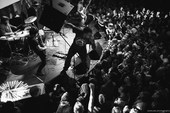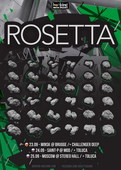Rosetta
Across The Universe
20.09.2016
Архив интервью | Русская версияRussian fans of groundbreaking thought-provoking music are in for a new trip across the Universe with U.S. experimental metallers Rosetta. The band will land on the Russian soil for the third time, bringing along their latest album “Quintessential Ephemera” (2015) as a present and guitarist Eric Jerrigan as a new crewmember. The gigs will take place in St. Petersburg on September 24, and in Moscow on September 25. And while you are waiting for this to happen, you can enjoy our newest interview with guitarist James Matthew Weed, responsible for the band’s contacts with earthlings, who was kind enough to give us an overview of Rosetta’s daily routine.
You’re coming to Russia pretty soon and not for the first time. How did you like it here before and what do you expect this time?
Well, we’ve been to Russia twice before, I think the first time was in 2011 and then the second time was last year in March. And the consistent thing about it is the enthusiasm of the people who come to the shows. It’s one of those things where it seems like sometimes the further East we travel the more enthusiastic the people are, compared to the U.S. it’s a night and day difference. We just find that audiences in Russia, in Belarus, and in Ukraine as well have similar sort of the vibe. You know, the people are not annoying, they’re just really enthusiastic, really intelligently interested in the music. And I think that it’s really special, it’s really gratifying, so I expect the same thing this time as we’ve had in past. We’re not playing any more venues, it’s gonna be similar audiences but I am really excited because this is gonna be our first time in Russia with the five-piece band instead of the four-piece band. We have a new guitar player, and this is gonna be his first trip. So even though we’re going back to places that we visited before, a lot of it is new to him and it’s actually exciting for me to be able to bring a new friend to experience some of that for the first time.
I’m a bit surprised to hear that your U.S. audience is so different from the one you have here. In which ways are they different? And why do you think it is so?
It’s not all the same everywhere in the U.S., in different regions it varies a little bit but I think just that there’s so many bands on tour in the U.S. all the time, the year round, that to some extent people can’t go see everything, so when you play a show, the crowd’s gonna be smaller. In the U.S. people might play somewhere three times every year, so the saturation is higher. Just because of that, I think that the enthusiasm level is a little bit lower. And the other part of it is that I think in the U.S. and also to some extent in Western Europe people are self-conscious. They wanna look like they’re an intelligent appreciator of music, so to some extent they’re a little bit more physically reserved during the shows and things like that. But it’s actually fun for us when people are moving around and they’re stage diving, and they’re crowd surfing, and they’re having a great time. So to some extent like I just think that maybe culturally further to the East people are less inhibited than they are towards the West. And when you’re in a band, that just makes the experience much much better than it would be otherwise.
Did you get to see many places in Russia, or are there any you’d like to see when you come again?
Yeah, it’s a fascinating country, especially for people in the U.S. who don’t get to visit Russia very often. I have lots of friends who have visited Western Europe but I don’t know really anybody else outside of the music community who has visited Russia, certainly not more than once. So, you know, I’m really grateful for having been able to see Moscow, for having been able to see St. Petersburg, they’re both beautiful cities and really fascinating cities for a variety of reasons. Those are the only places I’ve been to in Russia, and Russia is a huge country with a lot more to offer than just those two cities. So my hope is that on a long enough timeline I’d be able to see a lot of other places as well. Prior to this trip we’ve always had to get a new visa every time we come, but we actually just recently got three-year visas, so we’ll be able to come back a few more times and maybe play some more places and things like that, that’s very exciting.
You’re said to be interested in astronomy, and that has become a sort of ‘brand’ of your band. Every time people write about you or talk about you, they remember that you play ‘metal for astronauts’ and all this stuff. Where does this interest come from? Do you all share it and do you still share it? I mean, it seems to be more true for your debut album, but I’m not sure that you’re still that interested in that subject.
Yeah, I am for sure and I think the other guys are as well. I think that we moved away from it in the music because it kind of felt like with the newer records we wanted to have more of a personal feeling and we wanted to them to be a little bit more vulnerable maybe, and have a more urgent quality to them. So the metaphor that we were using on the first two records wasn’t quite as appropriate for some of the later material. But I think we all still have that same interest and I think it’s not just a purely scientific impulse. We all also really enjoy science fiction and comic books, and a lot of these other things, so to some extent the astronomy thing just felt like a kind of metaphor that could tie a lot of these different sources of social commentary and criticism, it could tie it all together under a single header. Yeah, you’re right, it’s way more prominent on our first record and then to some extent on the second record, and less on the latter ones. But we all are still very much into that kind of thing. And even if it’s not too much of a subject in the lyrics anymore, I still think that for the instrumentals and for the kind of this song environment, the atmosphere that we’re trying to create, it is very very much like trying to get out of Earth, it’s trying to get spacy, it’s trying to move to this sort of unexplored ground zone, and evoke this feeling that you’re floating, and things like that. So that’s still a core part of what we’re trying to do.
You know, Russia is a country that has done much for space exploration. Do you have any plans to visit some places associated with that? Like some space travel museums, we have a few here…
Yeah, that’s exactly the sort of thing we’re interested in! Sometimes it’s just a question of how much time we have in a specific place to be able to see things. You know, if we’re in a different city every day, it’s like you have to pick one thing, only one thing which you get to see when maybe there’s ten or twenty different things that you’d actually like to see if you were there for longer, but we love doing that kind of stuff on tour. That’s always a lot of fun.
You have already said that you have a relatively new band member, Eric, a guitar player. And it seems like after he joined the band, you started making some kind of more guitar-oriented music. What’s the cause and what’s the effect: he joined and made your sound change, or you wanted to change it and asked him to join?
It’s maybe a little bit of both of those things. I think that we had actually already started to change in that direction before we even thought about asking him to join. And so it kind of felt like it was something that fit with the direction that we were already moving in. And the other thing is that we’ve known Eric for many many years. I think that we’ve been friends for about nine years, but he’s actually only been in the band for two years now. And he was in another band called City of Ships that we toured with several times over the years. Our first European tour was with them and we’ve done some U.S. touring with them. It’s just like really really deep friendship that was already there before he was in the band. And he just had a totally different skill set than any of us had. He’s a good guitar player, but his personal style is very different from mine as a guitar player, so it kind of felt like there was an opportunity there to broaden the different types of sounds that we can make and to have a kind of melodic conversation between that sort of thing that I would write and the sort of thing that he would write. At the same time he’s also a competent singer and his voice doesn’t sound anything like either Dave’s voice or Armine’s voice. So there was a way that we could fill the gap because Dave’s voice has a very sort of soft and melodic quality, he’s a really good singer but his voice has this incredibly pure tone to it, and then Armine’s the opposite, it’s deep, it’s screamy, it’s aggressive, and it’s gruff. And we didn’t have anything in the middle. But when Eric joined the band, all of a sudden there was something that was right in between those two. And it felt like we had a complete range of different vocal textures. We started being able to experiment with vocal harmony and having parts when everybody sang all together at the same time, so yeah, I mean, I remember when we were just starting to write some of the songs for ”Quintessential Ephemera” (2015), I was really interested in the band Oceansize and they actually broke up in 2010 but I had been listening to them for many years and just kind of like got interested all over again in some of their older albums and that was really influential for me, it kind of just happened to fit with some of the stuff that Eric was coming up with. So we didn’t wanna add Eric just as another body on the stage to just play some extra guitar parts, we wanted him to contribute more prominent things and that was definitely the things that we’d been looking for before he joined the band. That being said, I think now we’re actually moving in a little bit of a different direction, so the stuff that we do together for the next album is gonna have an even more different feel. It’s probably gonna be a little bit darker, it’s gonna be a little bit heavier, that sort of things. It’s gonna start to swing back in the other direction a little bit.
Yeah, changes are great, but somehow it feels like many of your fans show more emotional response to your older recordings. They want you to play some music from those records live, they still talk about how much they like them and so on. Is it a kind of burden for you? Is it like after you had those well-loved records, you have to convince people that what you’re doing now is also good, maybe even better, but people are being nostalgic or conservative about how they want you to be?
Yeah, and sometimes it’s frustrating. I try not to spend too much time thinking about it because the interesting thing is that when “The Galilean Satellites” came out in 2005, nobody cared. It’s just, nobody was interested. We played those songs for seven years, and it was only towards the end of that period that people were getting really excited about it. Sometimes I think that maybe it just takes time for the ideas to sink in and that the material we’re writing now, maybe in six or seven years from now somebody would think that that’s our best work because it might just take time for it to sink in. I don’t know. But, you know, I think the problem with “The Galilean Satellites” is just that we were very different people when we wrote that album. You know, I’m 33 years old now and I was 20 when we wrote those songs. I was in university at that time and my life was really different, and those songs kind of represent the kind of guitar player I was at that time. Now I’m personally not interested in playing that material. I was done with it though I can understand and respect if a fan feels differently, or maybe they just discover the music after we stopped playing it, so they never got to hear it live, and that’s unfortunate. But I think if we went back and played that material now, there would be something maybe false about it, that it just wouldn’t be an authentic expression of who we are, but I don’t feel that way about our second album, for example, so actually when we come to Russia this time, we’re gonna be playing two songs from “Wake/Lift”. They’re not quite as old but they’re still pretty old. And they’ve been arranged now for two guitar players. So it’s not that I am totally opposed to playing old stuff in general, it’s more just that sometimes when I go back to “The Galilean Satellites”, it almost feels like it was written by a different person. And there’s something inauthentic about it. It’s not who I am anymore.
Are you writing anything new while touring?
We usually would stop touring before we start writing new music. We have done a little bit of work on some new songs for a new album. They’re not finished. It’s like the skeletons of new songs. But because we’ve been touring a lot, we haven’t had a chance to develop those. We’re obviously going to Russia and then we have one more short tour in Japan before the end of the year, and after that we’re gonna be done for a little while. And actually it’s gonna take a few months of no touring just to try and write new songs, and once we have a new body of songs that feels like it’s coherent, feels like it’s integrated, then we would start looking at a schedule and a timeline for when the next album could come out.
How long does it generally take you to finish your new material?
Usually about a year. From start to finish, it takes about a year. And obviously that’s not the only thing we would be doing. You know, we would often do some other things, do some tours during that time. But it’s usually like that. Yeah, “Quintessential Ephemera” took us about a year, and I think “The Anaesthete” (2013) before that took about an entire year to write all the songs and to get them to the place where we were happy with them.
You also get a lot of questions from fans on your website. Is it you who answers them most of the time?
Yeah, most of the time it’s me.
And why is it so? Are you the most responsible guy or what?
(laughs) Yeah, maybe. I think part of it is just that it comes like dealing with social media stuff comes naturally to me, I probably have the most experience writing of anybody in the band, so writing concisely comes naturally to me. At the same time though, part of it is that I’m self-employed, so my schedule is more flexible than all of the other guys’, so I have more time during the day to work on stuff on social media on the Internet, answer the band e-mails, that kind of stuff. So most of the management is up to me as well. It just kind of happened, it wasn’t something that we collectively decided about, it’s just something that fell to me over time.
And what do you do?
I actually build and repair guitar amplifiers and effects.
Do you choose which questions you answer and which you don’t answer, or do you try to reply to anyone who writes to you?
I try to reply to all of the new questions. So if a question had been asked before, I generally won’t spend time answering it again. And I have to prioritize as far as how I spend my time online. I usually don’t answer questions that don’t have any answer. So for example if someone asks, you know, ‘when are you coming to Illinois’, I don’t know, so I can’t really answer this question. So in those cases I will let those things go. Also sometimes people write stuff that is not really a question, it’s more like a criticism or an accusation, or something, or maybe it’s just a statement, “hi, I like your music”, or whatever, and I won’t necessarily answer those because they’re not really questions. But otherwise, if it’s a new question, it’s actually a question and it has an answer, I try to answer everything that comes in.
And you seem to get lots of questions about some technical issues, about the equipment you use, and some effects, and so on. Actually I was wondering if it is your choice, if you yourself like to discuss things like that, or if it is more like so many of your fans are not only interested in that and know something about it in a professional way, but also want your advice.
Yeah, I think it’s probably just that in the style of music that we play, a lot of our fans are also in bands themselves. It might be just true of metal, I think most people who love heavy metal also are in bands because it’s one of those things that you don’t just listen to it – some people do and that’s fine – but a lot of people who listen to it also are really motivated to pick up any instrument, a bass, a drum set, a guitar, and try to play themselves. And then if a person who plays in a band you like is easily accessible, then why not ask them what they use, so you can make those sounds yourself. So yeah, those questions are easy for me to answer because that’s my job and that’s what I do, but at the same time I really do think that just a lot of our fans are interested in that, and it’s maybe not just that they are interested in guitar equipment, it’s probably that they play guitar and they’re trying to figure out how to make certain types of sounds.
Do you yourself often ask for advice?
Not very often. I think when I ask for help, I’m usually talking to amp technicians who are older and more experienced than I am. And I’m usually talking to them because I have a problem with the job that I’m working on and I feel stuck, and if I need some help. But a lot of these people might be 60 or even 70 years old, and I’m going to them not as a musician but as a technician in their professional capacity and asking for help because I need a little push or a little bit of support. I don’t generally find myself asking for equipment advice from other musicians because I spend so much time working on equipment that I usually know what I need to know in terms of being able to make the sounds that I wanna make, and that’s something that I enjoy exploring a lot, maybe more than other players because I work on amps and guitars for a job, it’s something that I automatically know a lot about and I’m always interested in finding new sounds on my own.
Your pay-what-you-wish strategy is very much discussed among your fans, and when you first tried it with your previous full-length album, you wrote about how it was and what kind of drawbacks and disappointments you had. But still you didn’t drop the idea and you’re still doing that. How is it going now and did you improve the strategy learning from your mistakes?
When we changed something, each time it’s been really really small changes. So it’s like try to change just one thing and see how much of a difference it makes. Yeah, we are trying to revise the model but there’s just very a little bit at a time. One of the things that we tried on this last one was having the physical copies and the digital come out on the same date. The time before, the CDs and the vinyl came out a lot later than the digital. And actually what we learned is that it was not a good idea to have them come out at the same time. That actually the sales of both do better when they come out on different dates. So probably with the next record we’ll go back to what we did the first time when we had the digital come out on one day and then the CDs or vinyl come out a little bit later. Some of the other stuff is that we found out that even though we are totally independent, it’s really worthwhile to pay for PR and to actually have a publicist work on our behalf to market the record in advance of the release to actually have a few copies out to people ahead of time. That really really helped us on this last one and that’s something that we would definitely do again. So it’s kind of, you know, we’re beginning to do a lot of the normal things that a record label would do, we’re just doing them without the record label, just kind of doing them ourselves. And if we can do them ourselves, then we don’t really need someone else to do them for us and in the end we actually end up making significantly more money from the album sales than we would if we were signed to a label. And I think with the pay-what-you-wish model there are more people total getting music which is important. If I have a choice between making this amount of money and having the record only go to 2,000 people versus making the same amount of money and having the music go to 10,000 people, I want it to go to 10,000 people. Because I want more people to be listening to it. And it seems like the pay-what-you-wish model does not reduce the amount of money that you’re able to make from a release, but it does make sure that the release goes to more people and that there are more people listening to it, and that’s something that we’re really happy about. As long as there’s enough money to cover our expenses, we’re okay with that. And then beyond that, the main point is just to have as many people listening to the music as possible.
So it’s mostly like a very demanding hobby than anything else…
Yeah, kind of. It’s like we are trying to make money, but it’s never gonna be enough money for the five of us to live on, and we recognize that, so we want the band to bring in enough money that when we wanna tour somewhere new and it’s a big risk, we have the money for plane tickets and that sort of thing, or when we wanna try working with a new producer for our recording and maybe it’s gonna be a lot more expensive than we thought it was gonna be, the money is there and we’re able to do that. None of the members personally benefit, and I don’t get paid to be in the band. Yeah, the band makes money, but all of that money gets used for the band to do things like tour, or record, or whatever else it is that we wanna do. And it’s really nice that I don’t have to spend my own money to do band stuff. We’re happy with that, it’s totally fine. It’s just the questions like that of what new places can we go to and what new people can we introduce our music to. It’s not a job, it’s not a hobby. It’s something that we do because we love it and it’s important to us. Sometimes it feels like I don’t have a choice, like I have to do it and I can’t really explain why, I just have to do it, so I keep doing it even when it becomes very very challenging. And it’s something that has always been really worthwhile for us. It’s been 14 years now and we’re still doing it, and we’re planning to continue doing it.
Special thanks to Alexei Runenkov (Booking Machine Agency) for arranging this interview
Rosetta on the Internet: http://www.rosettaband.com
Ksenia Artamonova
September 13, 2016
© HeadBanger.ru





